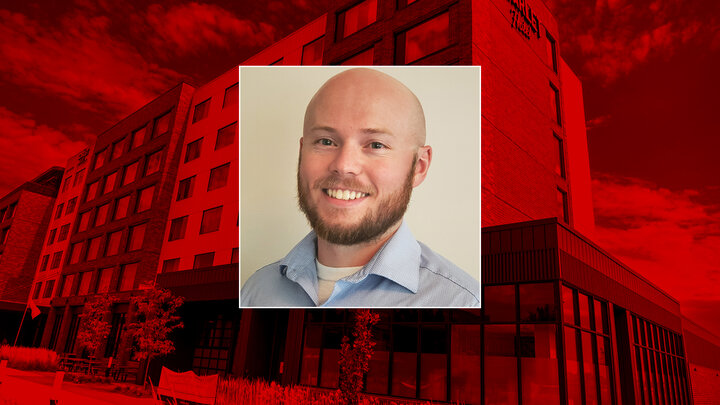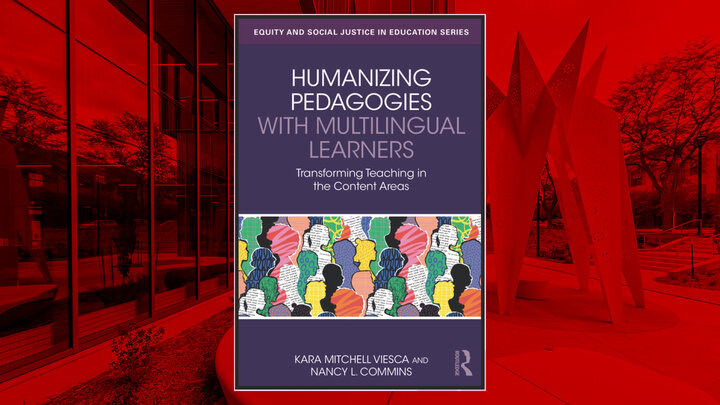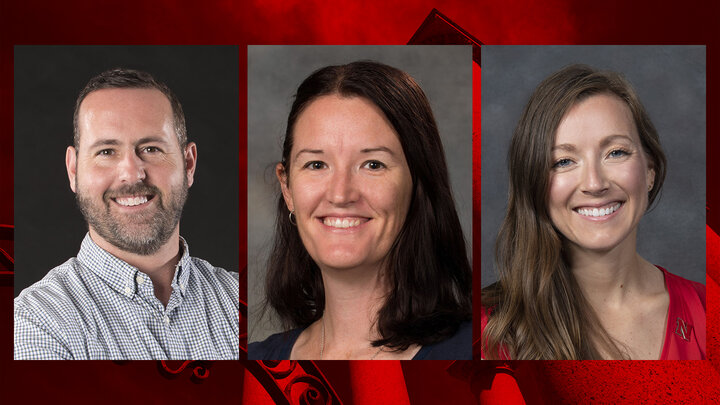After serving eight years in the U.S. Marine Corps, CEHS alum James Doyle (‘23) returned to the University of Nebraska-Lincoln to earn his degree in Hospitality, Restaurant and Tourism Management, commuting 28,000 miles to attend in-person class. Today, he serves as mayor of Belleville, Kansas, Chief Financial Officer of the Belleville High Banks Speedway, and founding partner of PIT RD. Hospitality, where he’s building his first hotel. In this Q&A, James shares how his military experience and UNL education shaped his leadership and inspired service to his community.
What have you been up to lately? Can you share a bit about yourself/ background?
I toured the University of Nebraska-Lincoln in 2009 as a high school sophomore with the intent of soon earning my bachelor’s in music education. After graduating high school, I served for eight years in the United States Marine Corps, taking online classes with a few other schools when able. In 2021 I decided to try my hand at full-time, in-person course work to graduate with a degree in hospitality management, specializing in both lodging and food and beverage services. After 28,000 miles of commuting, I graduated the day before my 30th birthday and am proud to say I have a college degree!
Currently, I serve as the chief financial officer of the Belleville High Banks Speedway, mayor for the City of Belleville, Kansas, office administrator of Central Christian Church of Belleville, and founding partner of PIT RD. Hospitality focusing on building our first hotel.
Can you tell us about your time at UNL? Why did you choose to attend UNL and pursue your field of study in CEHS?
Our Hospitality, Restaurant and Tourism Management (HRTM) program is one-of-a kind, and while I wasn’t able to attend classes in the newly completed facility within the Scarlet Hotel, I can brag about it to anyone who has interested in the hospitality management world (let’s be honest, I brag about it to everyone anyway because Go Big Red!). My decision to return to school and complete my undergraduate degree with the University of Nebraska-Lincoln was based solely on the fact that our programs are strong, unique, and relevant to the industries they focus on both nationally and internationally. I am also trying my best to build a hotel in our community, so having formal education in the subject doesn’t hurt.
Are there specific classes, experiences, or faculty members from your time at CEHS that had a lasting impact on you?
Dr. Ajai Ammachathram and Joan Kunzman were instrumental in helping me complete my degree, especially as one of the non-traditional “old” and commuter students. Their mentorship and guidance through the course and after graduation have been powerful tools in helping me to keep my sanity and succeed. I assure you, everyone in any of my classes was fed in their weight of donuts, homemade cakes and cookies, and a sprinkling of fresh fruit when I’d remember we need balanced diets!
Our minor program in Leadership and Communication (ALEC) under the College of Agriculture was both eye-opening and inspiring. Having been a Staff Noncommissioned Officer in the US Marine Corps, I believed I knew and understood people’s motivations and how to tap into that. However, these courses dove into the reasoning for people’s motivations, the numerous theories explaining the differences in motivations, and so much more! The phrase “protect the voices from below” has stuck with me from our textbook to our classes, to everyday life. I highly encourage anyone seeking electives or deciding on a major or minor should take a few of the ALEC courses to better understand how to lead instead of simply manage.
Since graduating you’ve been a city councilperson and now the mayor of Belleville, why did you decide to get involved in local government?
I decided to serve at the local level in 2020 shortly after moving back to Kansas. I was 27 years old, had time and energy, and believed I could create positive change with my millennial perspective. Soft bragging point, but I was actually a council member while attending UNL meaning I commuted roughly four hours every Tuesday and Thursday between Kansas and Nebraska to finally earn my bachelor’s degree. In May of this year, our former mayor resigned to fill a county-level role within a different county, and because of state law, I was the next person on the “chopping block” and was appointed to the position. I am beyond grateful for this new experience. As of now, I am running unopposed for Nov. 4 election, so I must be doing something right and look forward to the next two years as an elected mayor.
Can you tell us more about Belleville? What’s your favorite thing about your community?
Belleville is an agriculture, manufacturing, and tourism-based town. It is the smallest city named Belleville in the country, with a community of just over 2,000 people. The city is the halfway point between I-70 and I-80 and is located 40 miles east of the middle of the contiguous United States. Two significant highways, U.S. 36 east/west and U.S. 81 north/south, meet in Belleville, earning it the title of “Crossroads of America.” Belleville is perhaps best known for two things: its award-heavy, outstanding musical programs within junior high and high school, and its local half-mile dirt racetrack, which holds two notable accolades-the World’s Fast Half-Mile Dirt Track and the nation’s second-longest continually operating racetrack, which opened in 1910 and has hosted a season every year since, most recently completing its 116th season.
How did your time at CEHS, and specifically in the hospitality program, prepare you for leadership roles in your community?
I left the military in late 2019, and this world, the real world we actually live in, has a lot more freedom and risk for the individual than the structure I was used to. The civilian world can feel massive and alienating at times. Our staff and faculty saw me as a person and an individual which greatly helped my transition to being a regular person.
Also, the hospitality program strongly reinforced my love for hospitality – the tangible products and the intangible experiences we create, both of which can be found in every industry and in every community across the world. I also mentioned above that I founded a company whose focus is currently on our flagship hotel. The staff and faculty in our program were great sounding boards for ideas, questions, and concerns that I or others involved in the project have had, and when we couldn’t find solutions within our programs, these mentors would point me to industry leaders they personally knew. Our staff and faculty are always approachable and willing to help where able, which reminds me to do the same here at home.
What skills from your hospitality education do you find yourself using most as mayor?
As a city, we’re very blessed to own our utilities, and our biggest focus as the over the last five years has been infrastructure. From our power and water treatment plants to sidewalks between schools and road maintenance, we are required to anticipate our community’s wants and needs, arguably hospitality’s number one objective. I am confident that we’re finally in the position to be proactive and catch issues before they affect our constituents.
One such item is pursuing a state-level grant for community centers in smaller, rural communities. The community center itself will be rife with hospitality-focused activities, but the planning and building of it, from kitchen design and multi-use space to restrooms locations and bar layout are all parts of what students will experience within our hospitality program at UNL.
Lastly, while many focus on the anticipation of needs and the tangible and intangible products, it is imperative that everyone also focuses on the mitigation of liability. I would argue that from Legal Environment, a course offered in the HRTM program, I have attempted to apply everything from that course and textbook to all projects we’ve worked on as a city within the last few years.
How do you think being a young leader and Husker alum gives you a unique perspective in your role?
In a state that bleeds purple and blue, absolutely! It also never lets our old Big-12 rivalries never die haha. Nebraska gave me many tools and continues to offer much-needed support in my hospitality and public service-focused careers, and I will never cease to be grateful for this. Combining that with being a 32 year old gives me the unique perspective of being old enough to admit I don’t know everything (anything) but young enough to still try to solve issues and tackle challenges with different approaches instead of settling for things being a certain way because they’ve always been that way. UNL is a huge part of me being who I am today, and I am grateful for the experiences and friends I’ve made out our university.
What advice would you give to other CEHS students or alumni who want to make a difference in their communities?
The local level, be it government or volunteering, has a much larger impact on your life and the lives immediately around you than people believe or give credit. If everyone gave an hour to volunteer with something (soup kitchen, non-profit arts, church, chamber of commerce, etc.), or so, a month…could be more, could be less…our local levels would be so, so, so much better than they currently are. We spend so much time focusing on the state, federal, and international issues and allow those to tear us from our neighbors and loved ones. Unplug for a bit, look left and right to your neighbors, friends, and families, and focus on the issues on which you all have a direct impact.
It costs absolutely nothing to be kind, but it is also important to remember you cannot pour from an empty cup. What I mean is we really have no idea what someone else may be going through, and a kind word can go very far. When we ourselves are feeling down and out, it is okay not to go the extra mile in order to give yourself time to rest and recoup.
What’s next for you? Are there specific goals or initiatives you’re passionate about as mayor?
If this was 2018 and I was still in the U.S. Marine Corps, I’d claim with full belief that I’d be a third-party presidential candidate in 2036. If this was 2022, I’d claim I’d eventually be the governor of Kansas. Today, I simply seek to be content with where I am, to pursue a graduate degree in city planning, rural community economic development, or some other high-level public service focus, and to live in a quiet space surrounded by autumn colored flora.
Our world moves quickly, and it has felt like we’re all quick to anger for a few decades now. I aim to find a place where discussion is strong, neighbors care, and I can be a humble servant to Christ, a good husband, and a supportive dad one day. If my community needs me to serve as mayor, council member, or some other capacity, I will serve the constituents as best I can without compromising my principles.
College of Education and Human Sciences
Nutrition and Health Sciences
Strong Communities
AlumniNews




